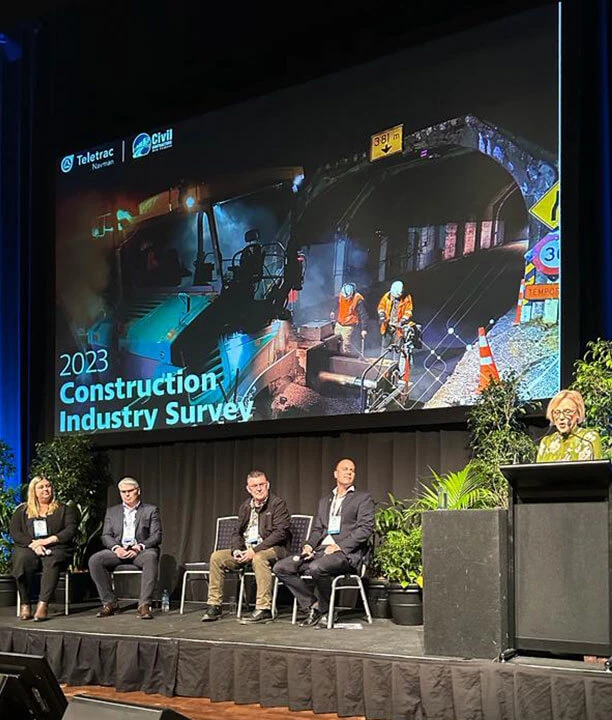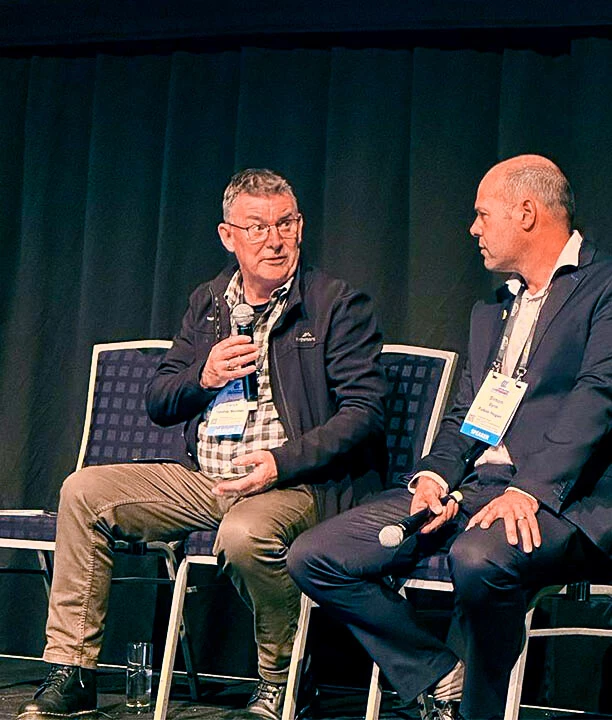NZ’s infrastructure may not easily cope with increased severe weather events and the impacts of climate change. Building more resilience in the country’s infrastructure will go to help protect social and financial wellbeing.
This is just one of the key findings from the 2023 annual Construction Industry Survey, a partnership between Teletrac Navman and Civil Contractors NZ. On September 1, our Construction Industry specialist, Jim French, was part of a panel at the Civil Contractors New Zealand Conference 2023 discussing the "State of the Civil Construction Industry".
Joining Jim to provide a glimpse of the industry’s health and to discuss insights derived from the recent Construction Industry Survey, were Bailey Gair – SCL Civil Works and CCNZ President, Paul Bisset – Whitestone Contracting and Simon Dyne – Fulton Hogan. Each of these panellists offered a unique perspective on the challenges and opportunities shaping the industry.
2023 Construction Industry Survey
This is the seventh Construction Industry Survey - a research partnership between Civil Contractors New Zealand (CCNZ) and Teletrac Navman.


Great expectations from the next government
When asked about what they expected from the next government, all panellists agreed on the critical need for pipeline certainty – a consistent theme throughout their responses. Even in the political flux of an election year a clear vision for the future remains a constant demand. The industry wants government to instil much-needed confidence in work continuity and financial security.
Simon Dyne explained, "The most frustrating aspect for contractors is completing a job with exceptional people, only to face a lack of future work. With pipeline certainty, we can expect improved productivity, better job opportunities, and a thriving industry."
Jim French emphasised this point, highlighting the difficulties faced by contractors when they lack clarity in government plans. He stressed the importance of outlining a clear plan and sticking to it: "Governments need to lay out their plans comprehensively, detailing what, how, and when projects will be executed."
Delving into the training aspect, Paul Bisset added: "Certainty of work will enhance our commitment to training. Many training qualifications take several years and costly investment. We won’t invest in our workforce without work certainty."
Resolving industry challenges
Addressing industry challenges took centre stage next. Workforce development and retention, alongside the role of technology, were key discussion points. The need for a proactive approach and an ongoing people development plan resonated among the panellists.
Bailey Gair, providing a perspective from an SME, emphasised the importance of culture-building and proactive efforts to retain staff. "We can’t control macro factors, but we can control our culture, invest in upskilling, and ensure our business retains capability," said Bailey.
As construction businesses grapple with workforce constraints, technology adoption emerged as a potential solution. Jim acknowledged skills shortage as a global issue, which highlighted the increased importance of collaboration and innovation. "Teaching our own people to better use available technology can enhance productivity and increase margins – an opportunity often missed," said Jim.
Adopting technology and bridging the learning curve
Technology adoption has shifted from luxury to necessity for construction businesses. The panel delved into the impact of technology and how to support those less tech-savvy.
Simon pointed out that AI and other technologies can simplify administrative tasks, allowing businesses to focus on more critical activities. He cited an example, "In our quarries, drone technology has replaced manual stockpile measurements. It’s efficient, safe, and opens doors to further advancements."
Jim predicted that aggregating data, whether for machine control, fleet management, or safety practices, would have a significant impact on the industry. He stressed the importance of making technology accessible to all workers, regardless of their tech literacy, saying, "Manufacturers must ensure their products are user-friendly across multiple platforms."
Sustainability practices
Embracing sustainability not only fulfils environmental obligations but also positions businesses for future demands – a topic that emerged towards the panel’s conclusion.
Bailey Gair noted that they are increasingly asked about their sustainable practices. "We’re being asked to prepare for providing more information on sustainability in the future," she said. While it’s unclear if jobs are won or lost solely due to sustainability, it reflects the growing importance of a commitment to and demonstrable understanding of sustainability.
Transparency regarding sustainability practices is equally important. Simon stressed that sustainability should not be mere lip service but a sincere commitment to a greener future: "With the world changing due to climate change and extreme weather events, sustainability efforts must be genuine and not just for show."
The panel discussion showcased the industry’s resilience and adaptability in the face of challenges, reminding businesses of the need for long-term planning, workforce development, technological innovation, and genuine sustainability efforts. These insights will undoubtedly shape the industry’s future successes as it continues to evolve.

